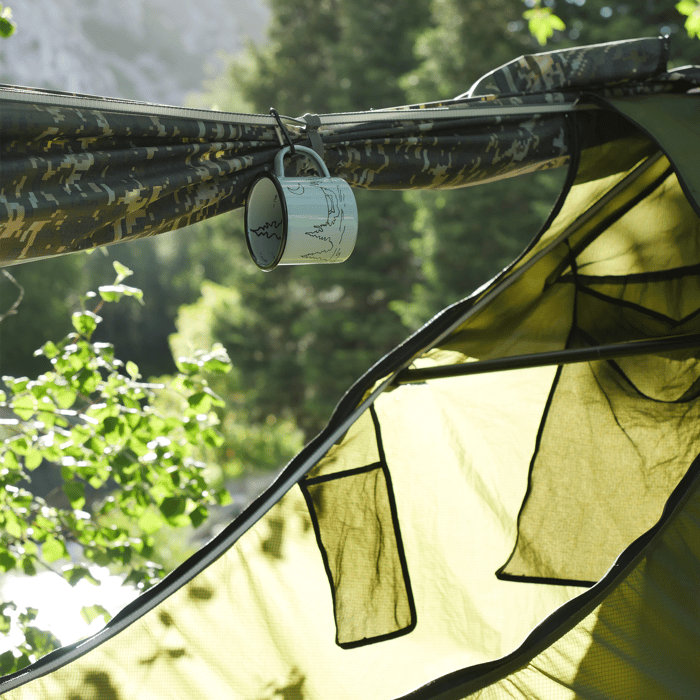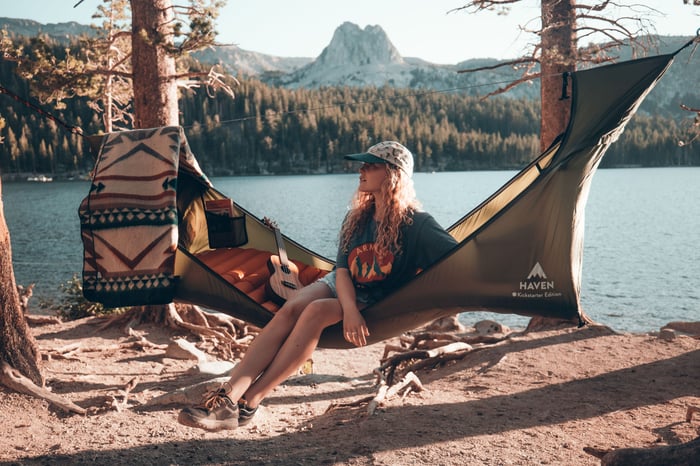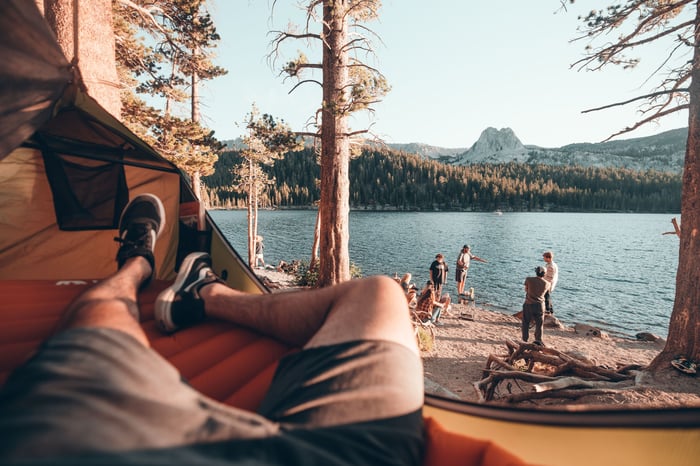How to Camp Green
With the increase of people interested in camping, hiking, and outdoor activities, we are seeing an increase in wear-and-tear on the environment. Obviously, we should do our best to decrease this. There are plenty of ways to reduce your "footprint" without compromising your enjoyment of the great outdoors.
Gear
Buy Used Gear
How much gear do you own that has only been used once or twice and is in pretty much in brand new condition? It's probably more than you care to admit, right? Well, so does every other outdoor enthusiast! The used market is one of the best ways to get gear and avoid the landfill just that much longer. For years, I have almost exclusively bought on the used-gear market and I have very few bad experiences going for second-hand gear. It’s also a great way to save a little bit of money since gear gets expensive!
At Haven, we periodically sell Haven Seconds as we get them in stock. Check out our used gear page here.
Repair Your Gear
Wear-and-tear should be a badge of honor! Keep it going. Repair what you already own. Most rainflys use a waterproof coating that can wear off over time. Did you know you can re-waterproof the rainfly of your tent or hammock? You can also re-tape a seam on your tent. Why should your gear languish in a landfill when it could join you for another adventure?
Check out the Haven Repair Kit here

Picking Green Camping Equipment
Picking the right sustainable gear is another way we can be a little more eco-friendly when camping. When choosing camping gear, lookout for natural or recycled materials. Avoid materials and chemicals that could be toxic to the environment.
Trail/Campsite
Stay on the Trail
With the number of people enjoying the outdoors increases, there can be a huge environmental impact when people start trailblazing on their own. From hurting the local ecosystem, to taking out plants or animals, do your best to stay on the trail to keep the wilderness open to everyone for years to come!
Picking the Right Campsite
We all need to sleep, but there are things we can do to lessen our impact on the ground we sleep on. First, look for dedicated campsites. We've all seen and used them. They are there to lessen our overall environmental impact, so take advantage of them whenever there is an opportunity. If that isn’t an option, look for dirt, sand, gravel, or rock depending on where you’re camping. Setting up camp in these places versus on top of plants will lessen the impact you’ll have.
For backcountry adventures, try to find sites far enough off trail that they may only be used once every few years. Try to use it “as is”. Don’t move rocks or break branches. Hammocks are great for low impact camping as they do not require a ground footprint.
When I’m exploring the backcountry, It’s pretty easy to tell where tents have been pitched over a season, but you can never really see where hammocks have been -- as long as you are using adequate tree straps, that is.
Trash
We’ve all heard it -- pack out what you pack in. Easy to say, but harder to do. We all see some trash at almost every campsite, so make a point to collect every piece of trash you bring in, and double-check your campsite as well as downwind before you leave.
And no, you can’t just burn everything. Freeze dried meals have a metal foil that will not burn away. Stirring the metal into the ashes isn’t hiding anything. Pack it out!
Campfires
What is camping without smores, stories, and deep conversations around a campfire at night? It’s really one of the best memories we take from camping. But how do you make a campfire with the least impact on the environment? Always check for fire bans before you leave for your trip. Use dedicated fire pits if that is an option. When that isn’t an option, build one out of stones to contain the fire. When you’re able to, use wood that you find on the ground in the area, to avoid bringing other organisms into a new area that could harm it.
Start your fires without using lighter fluid or gasoline. There are plenty of ways to start a fire without either of those, sometimes it takes a little more prep to make sure you have the right equipment such as flint and steel.
Never leave a fire unattended and be sure to completely douse your fire when you’re done.

Eco-Friendly Resources
Gear
When buying your gear, think about the overall lifespan of your tent. For example, are you considering something that will last a year or two or something that will last 10+ years? The longer you can use your gear, the less ends up in landfills.
There is a big push for UL (Ultralight); buying the lightest gear you can find. But lightweight doesn't always equate to durable… You may end up with an extra pound or two in exchange for years of dedicated service. Sounds like a good trade to me.
Green Cleaning
When cleaning your gear at home or your dishes out on the trail, consider the chemicals used in the cleaning solutions and soaps you use. Always look for 100% natural options, biodegradable soaps, and if you can, make your own home-remedies so you know exactly what you're using to clean.
Bug Repellant and Sunscreen
Many bug repellent products and sunscreens have chemicals that are harmful to the environment. If you're catching the tread of this article, look for natural or homemade solutions over the easy-to-grab aerosol options out there.
DIY Snacks and Meals
Think about the amount of waste when you make a meal out on the trail from packaging alone. A few things to ask yourself. Do your make your own DIY energy bars/balls? Can you pack multiple meals into a single reusable baggy? There are a lot of little things that go a long way when you’re out on the trail.

Reusable bins/bags
We touched on this earlier, but using a container or reusable bags can significantly decrease the amount of trash you bring on the trail. With that being said, it can increase the size of the food you pack due to having a rigid container vs an individually packed snack. But if you are really committed to green camping, look into different reusable bags or containers! There are a lot of good options out there!
Reusable Dishes
Let’s be honest. We have all been on a campout where we use paper or styrofoam plates/cutlery and then just throw them into the fire right after. So convenient right? But think about the potential environmental impact that has. To really eco-friendly camp, consider using reusable dishes. There are so many good options that pack down or fold down into convenient sizes and don’t add too much weight!
Reusable Water Bottle
Reusable water bottles are awesome for the environment! The world goes through more than 480 million disposable bottles each year, so anything we can do to reduce that is worth it. There are so many great options when it comes to water bottles, from camelbak to Nalgene, there is one for everyone out there!
Portable Utensils
Portable Stoves
When it comes to stoves, there is a clear winner. Liquid camp stoves is where it’s at. Instead of having to throw away canisters after every campout and potentially wasting fuel, all you have to do is get your fuel and fill your bottle before you leave which decreases the amount of waste from a canister and fuel perspective.
Portable Showers
There are a few things to consider here. First, do you need a shower while camping? Could you get away with using a washcloth or similar for your trip? If you have to go for a shower, consider the materials used and make sure they are eco-friendly. If you go for a heated option, look at the different solar heating options available vs the gas or other electric heated options. Of course, make sure the soap you are using is also eco-friendly, and check how far you are away from natural water sources to make sure to not contaminate the local water.
Portable Solar Lamp
We all need light when camping at some point. There isn’t a way around that. But when selecting your light source, think about solar options. Portable Solar lamp options are great since they are usually pretty lightweight, and produce enough light for doing things around the tent at night.
Portable Solar Panels
Instead of packing packs of extra batteries for all your gadgets, consider using solar panels to charge things during the day. Solar panel technology has made huge improvements over recent years, and could be a great option for extra power for your next trip!
Becoming a more eco-friendly camper is a journey. There are so many things we do every day that impact the things around us. If you’re someone who is buying your first reusable water bottle or you have repaired your tent 10+ times to keep it going, great job! Let’s work together to keep the planet a little healthier every time we go out!

Wondering how you can help keep the great outdoors, "great"? Check out our Ten Tree Mug. Haven Tents will plant 10 trees for every mug purchased. And it looks awesome, too!


.jpg)


